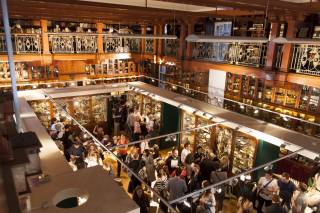This module provides an introduction to the history and theory of museums from a series of critical perspectives.

This course aims to provide an introduction to the history and theory of museums. It does so by approaching the museum from a series of critical perspectives, considering the museum, among other things, as collection, as institution, and as site for advocacy and social justice. It explores different conceptualisations of the museum by drawing on case examples which reflect a diversity of museum contexts in different regional and cultural settings. The course considers the role of museums in nation building, and their entanglement in localising and globalising processes; it explores the museum’s social roles and responsibilities from well being to climate change; it addresses how indigenous groups and communities reclaim their ancestors and heritage from institutions; and it confronts the legacies of colonialism through engagement with decolonizing initiatives.
Aims
Building on a tradition of ‘critical museology’, the course seeks to provoke students into questioning what a museum is and does, and what it can be. It seeks to provide the broader historical and theoretical context to enable students to engage critically with contemporary museum practice and to develop a clear understanding of professional stewardship and critical ethics.
Objectives
On successful completion of the module students should be able to:
- Demonstrate a good knowledge and understanding of the history and development of museums in different contexts
- Discuss and debate the concept and functions of the museum
- Employ theoretically-informed perspectives to critique established museological practice
- Demonstrate a familiarity with, and express opinions about, current museological debates
- Think and act beyond routinised 'Eurocentric' accounts and definitions of museums and cultural heritage, and be able to critically appreciate 'alternative' conceptualisations and understand the complexities involved in the globalisation of museological practices
Learning outcomes
- Familiarity with established knowledge
- Ability to apply knowledge in familiar and new situations for academic purposes
- Capacity for independent learning
- Capacity for critical thinking
- Capacity for independent inquiry
- Ability to read and understand a wide range of academic writing
- Ability to speak and write accurately on academic topics in an academically rigorous manner
- Ability to work as a team, make oral presentations and lead discussions
Teaching methods
The module is taught through a series of ten three-hour seminars which take place weekly in Term 1. These are supported by museum visits and talks, and film screenings. Students are expected to come to the seminars having read the assigned weekly readings, such that they can make active and informed contributions to discussions. The class will be divided into smaller reading groups. These groups will be encouraged to meet independently each week to discuss readings and undertake additional self-directed museum visits. Each group will be required make presentations and lead discussions in class.
Module information
- Code: ARCL0092
- Credits: 15
- Coordinator: Alice Stevenson
- Prerequisite: not available as an option to those taking other degrees.
- Handbook: open»
For registered students
Availability
- Runs every year
 Close
Close

